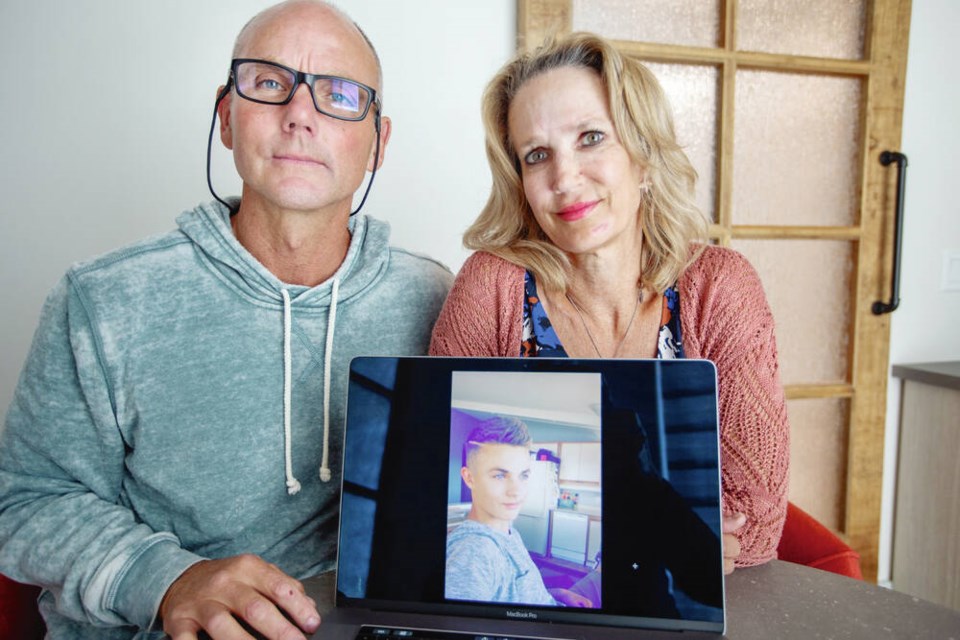An Oak Bay woman who lost her son to a toxic drug overdose isn’t convinced the federal government’s plan to decriminalize personal amounts of illicit drugs will save lives. That’s because police in the region haven’t arrested people for personal possession for some time, said Rachel Staples, whose son Elliot Eurchuk died in 2018 at age 16.
“Decriminalizing is not a bold move — it’s what’s been happening anyways,” said Staples. “A bold move would be to supply a safe drug supply for people who can’t live without it.”
In an exemption to the Controlled Drugs and Substances Act announced Tuesday, those age 18 and older in B.C. will be allowed to possess a cumulative 2.5 grams of opioids including fentanyl and heroin, cocaine, crack cocaine, methamphetamine and MDMA for personal use.
During the three-year trial period, set to begin Jan. 31, someone found with 2.5 grams of drugs would be provided information on available services or, if requested, help to connect with services.
Beyond providing a safe supply, which will certainly lead to a reduction in overdose deaths, the government should dramatically increase jail time for people who produce, import and sell toxic illicit drugs, Staples aid.
“These people are bringing in huge amounts of drugs and poisoning people — it should be classified as attempted murder,” said Staples. “Those would be bold moves in my mind. Elliot was poisoned. Somebody sold those drugs to him knowing full well it was poison.”
Police recommended the 2.5 grams based on the amount they typically seize from a person, which is just below that amount.
Leslie McBain, co-founder of Moms Stop the Harm, said she’s happy about the move to decriminalize personal possession of drugs in B.C., but disappointed that the federal government chose to exempt 2.5 grams instead of the 4.5 grams requested by the province and backed by a field of experts.
McBain, whose son died of an accidental overdose in February 2014 at age 25, said while personal consumption amounts vary based on factors including a person’s tolerance, it’s generally thought that a person addicted to illicit drugs might use 2.5 grams in half a day to a day.
“The fact is, 2.5 grams is a very small amount for people who are dependent,” said McBain. “It’s going to force them into a position — if they’re going to follow the law — of going out into that dangerous black market several times a day perhaps.
“Really, the bottom line is we need a safe supply, and then this whole thing becomes moot, right?”
Doug White, chair of the B.C. First Nations Justice Council, said the council, through submissions to the Mental Health and Addictions Ministry, suggested a personal exemption of four grams. He said the 2.5-gram cap doesn’t consider people in remote and rural areas who might have to come into towns for drugs.
“Today’s announcement of decriminalization of 2.5 grams appears to be focused on the urban context and has not factored in the ongoing crisis in remote communities,” said White. “We hope to see the threshold raised to four grams for personal use as soon as possible.”
Kora DeBeck, a research scientist with the B.C. Centre on Substance Use and associate professor at Simon Fraser University, was pleased that no drug seizures, fines or mandatory treatment for possession of 2.5 grams were included in the trial, as has been done with decriminalization elsewhere.
However, DeBeck said the centre’s studies show “extremely conservative” estimates of drug-consumption volumes for people most at risk as four to 13 grams for opiates, five to 14 grams for cocaine, and six to 19 grams for amphetamines.
“So a cumulative threshold of 2.5 grams is really just a lot lower than, you know, what are very conservative estimates,” said DeBeck, calling it a cautious and moderate policy.
With respect to monitoring and evaluation, she hopes policy makers will adjust if the 2.5-gram limit proves to be too low.
B.C. Green Leader Sonia Furstenau applauded the provincial and federal governments for decriminalizing personal possession of drugs in B.C., saying it opens the door to further policy reforms to reduce the death toll from the toxic drug supply.
“It is also important to note that decriminalization alone will not save lives,” said Furstenau. “We need to rapidly increase and expand regulated safe supply, and do it outside of a prescriber model.”



